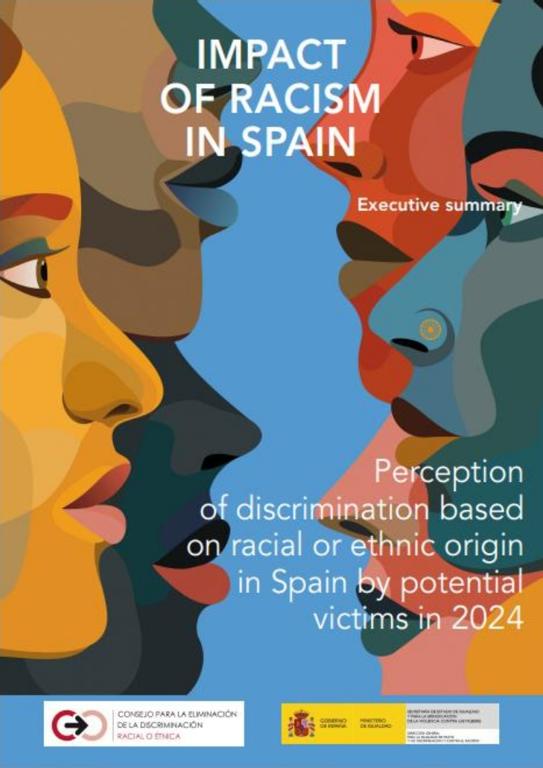One in three Roma people suffered racism in Spain in the last year, according to the latest CEDRE report (Council for the elimination of racial or ethnic discrimination) [editar]

Roma people remain the most discriminated against in Spain, according to the latest report ‘Perception of discrimination based on racial or ethnic origin by potential victims in 2024’. Despite this, it is the group that files the fewest complaints, due to a lack of confidence in the system and, in the case of Roma women, for fear of being re-victimised.
Racism in shops and hotels, refusal by landlords and real estate agencies to rent their homes, and discrimination in police actions make the Roma population one of the most discriminated against social groups in Spain.
This is the finding of the report Perception of discrimination based on racial or ethnic origin by potential victims in 2024, the fifth edition of the study carried out by the Working Group on Studies and Reports of the Council for the Elimination of Racial or Ethnic Discrimination (CEDRE) to monitor the scourge of racism in Spain and its impact on the most vulnerable groups.
The situation appears to be improving compared to 2020. In the last 12 months, 30.3% of Roma people have experienced discrimination or have seen people around them experiencing discrimination. This is 13 points less than in the previous survey, but the difference can be explained by changes in the composition of the sample, with more Roma coming from highly segregated backgrounds, ‘which tends to reduce their interaction with other groups and thus reduce the likelihood of experiencing discrimination on ethnic grounds’, says the report. Limitations such as these make it necessary to take any isolated and out-of-context data with caution, but this does not detract from the validity of the aggregate data set, according to which rejection of racialised people tends to increase in Spain.
Roma are, once again, those who perceive a more hostile image from the Spanish society as a whole. Eighty-nine percent of the Roma surveyed consider that their population group is perceived negatively, as ‘not hard-working’, ‘bad’ or ‘unreliable’. In the vast majority of cases, it is felt that the most widespread prejudices about the Roma community do not do justice to reality.
Areas of discrimination
In eight of the twelve areas analysed, the Roma population is the most discriminated against or one of the most discriminated against compared to the other eight ethnic groups. Patterns are fairly similar in most areas, but are significantly worse in four areas: discrimination by private security guards, police treatment (including excessive use of force), harassment by the neighbourhood and discrimination in open environments such as shops or shopping centres.
Access to housing remains one of the social areas most prone to discrimination for Roma, although at a similar level to other groups, as is also the case with regard to discrimination in the workplace. Roma are, however, the ethnic group with the highest unemployment rate (26.7%), far behind the rest of the groups studied (the average is 12%, almost identical to the 12.3% of the population as a whole in Spain in the first quarter of 2024). The percentage of Roma working with a contract is also much lower (40.5%, compared to 54.2% for all minorities), also due to the higher prevalence of self-employment. The picture of vulnerability is completed when comparing the level of education: 9% of the Roma surveyed have no education (compared to 5.3% for the group as a whole) and 33% have only completed primary education (compared to an average of 13.6%). These differences fuel the prejudices that attribute a low level of education to any Roma person, which explains why this group is also the one with the highest level of overqualification (Roma people are assigned tasks below their competences).
In the educational sphere, the number of cases of discrimination reported by Roma with school-age children is similar to that of the rest of the groups analysed, but the typical cases differ. Mockery, insults or bullying by other pupils are less frequent, while there are more cases of poor treatment by teachers and problematic situations with other families. On the other hand, it was found that the Roma ethnic group is one of the most segregated groups at school in Spain, which indicates that segregation mechanisms are already operating at school.
One of the main novelties of this edition is that it incorporates an intersectional perspective in several sections. In the area of gynaecological care, cases of discrimination are somewhat more frequent among Roma women than in the groups studied as a whole (13.6% compared to 11%), which - according to the participants in a discussion group of Roma women - makes them reluctant to take their daughters to these consultations.
In the section on sexual and gender-based violence, 4.8% of Roma women have experienced offensive compliments or sexual jokes in bad taste, and 6.1% have experienced unwanted kissing or unwanted touching. 5.4% of Roma women surveyed (twice the average) report having been pressured, blackmailed, threatened or forced to have sex. In contrast, Roma women are the least likely to report (only 1.5% did so) or to seek help. The explanation, from the focus group used in the study to explain the survey data, is that when they do report, they are not given credibility, are treated badly or are even made to feel guilty about what happened.
Under-reporting is, in general, a common problem among Roma. Unlike other groups studied, for whom there is a language barrier that discourages reporting, in the case of Roma the main causes are the normalisation of situations of discrimination (28.7% of the people surveyed, more than any other group), agree with the statement ‘It is normal for these things to happen, it is what we have to live with in my group’), mistrust of institutions (23.8% do not trust the police or the judicial system, while 13.7% think that there is no point in reporting) and the complexity of the process (14.9% feel that the procedures are too complicated).

